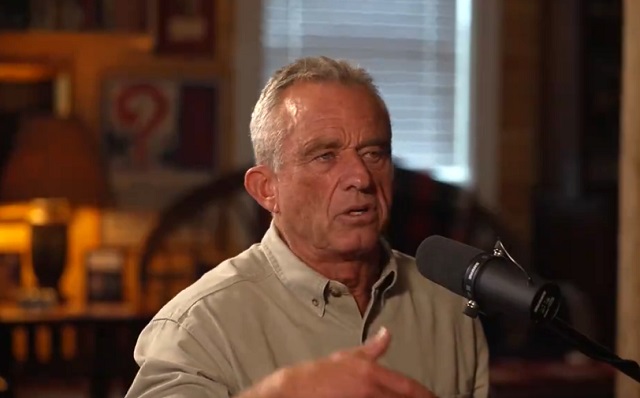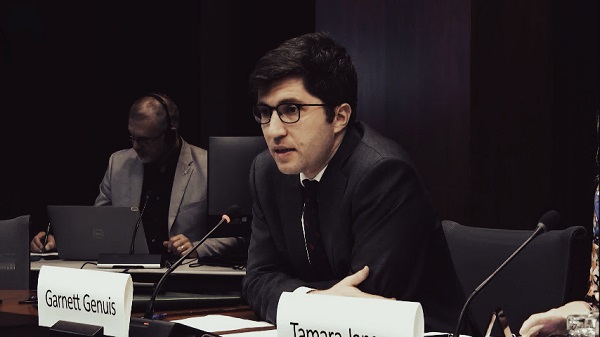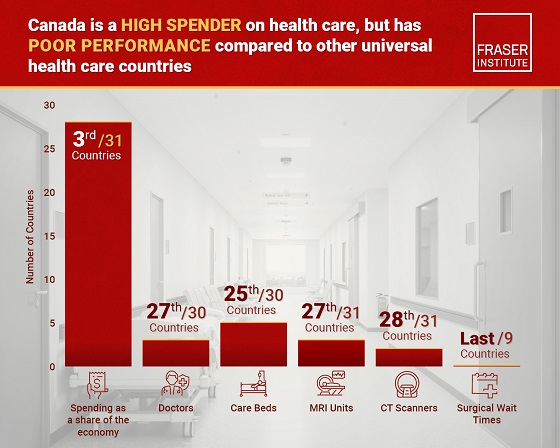espionage
RFK Jr. tells Tucker he would serve as Trump’s CIA director if asked

From LifeSiteNews
By Stephen Kokx
Robert F. Kennedy Jr. said it’s unlikely that he would receive Senate confirmation because committee members are ‘just safeguarding that (CIA) directorship and I would be very, very dangerous for those committees.’
Former presidential candidate turned Donald Trump supporter Robert F. Kennedy Jr. told Tucker Carlson this week that he would definitely serve as the director of the Central Intelligence Agency (CIA).
“If you were asked, would you run it?” Carlson asked.
“Yes, I would,” Kennedy replied. “But I would never get Senate confirmation.”
When Bobby Kennedy endorsed Donald Trump last week, he burned his boats. There’s no turning back for him, or for American politics. Here’s his first interview since that happened.
(0:42) RFK Jr. Endorsing Donald Trump
(11:26) Censorship and Pavel Durov’s Arrest
(34:56) America’s… pic.twitter.com/AOQULEvZeX— Tucker Carlson (@TuckerCarlson) August 26, 2024
Kennedy made major news last week when just one day after the Democratic National Convention he endorsed the former president in his bid for the Oval Office.
Kennedy was given a hero’s welcome by Trump at a rally in Arizona, during which he spoke about the need to end childhood illnesses and the “chronic disease epidemic” in America.
.@RobertKennedyJr takes the stage in Arizona! 🔥 pic.twitter.com/qXb3TjJOcJ
— Trump War Room (@TrumpWarRoom) August 24, 2024
Kennedy’s interview with Carlson indicates he has a sober grasp of the power the Deep State has over U.S. politics.
“As you know, the intelligence (agencies) are protected by very, very powerful committees in the Senate and the House,” Kennedy remarked. “And the people who serve on those committees … they’re just safeguarding that (CIA) directorship and I would be very, very dangerous for those committees.”
The pair additionally spoke about other areas of agreement between Kennedy and President Trump as well, in particular Trump’s promise to establish a commission to declassify the remaining documents pertaining to President John F. Kennedy’s assassination in 1963.
“I think everyone at this point knows the truth, which is the CIA is implicated in that. Those documents protect (the) CIA, maybe among others,” Carlson said.
“It’s odd that they’ve not allowed them to be released,” Kennedy replied. “It clearly is to protect the institution … and that’s wrong.”
Both Kennedy and Carlson noted that it was Mike Pompeo, a neocon who served as Trump’s CIA director in 2017-2018 who pressured Trump to not declassify those documents while he was in office for his first term.
While a formal role in Trump’s second administration has not been announced, Kennedy revealed that he is working on policy issues with the campaign at the moment and that if Trump wins he will be helping with the transition team to select persons who will run the government.
During an appearance on the Shawn Ryan Show podcast this week, Trump admitted that when he first won in 2016, he didn’t really know who to hire and that this time around he would select different people to fill key positions.
“I was a New York person, not a Washington, D.C. person,” he said. “In retrospect, I also picked some people I wouldn’t have picked. Now I know the smart ones, the dumb ones, the weak ones, the solid ones.”
Kennedy also said that he believes a historic political realignment is taking place as the Democratic Party has become the party of war and censorship ushering in a “corrupt” merger between state and corporate power.
On Monday, former Democratic Congresswoman Tulsi Gabbard followed in Kennedy’s footsteps and endorsed Trump at a rally for the National Guard Association in Detroit. Gabbard’s defection is significant in that she was a rising star on the political left not long ago, having served as vice chair of the Democratic National Party from 2013 until 2016. She resigned from that position in disgust after the presidential primary was rigged to ensure Hillary Clinton and not Bernie Sanders would be the nominee.
espionage
“Suitcase of Cash” and Secret Meeting Deepen Britain’s Beijing Espionage Crisis

Britain’s most consequential espionage scandal in a generation has narrowed on Keir Starmer’s inner cabinet after The Sunday Times revealed that alleged Chinese agent Christopher Berry was intercepted at Heathrow Airport with a “suitcase full of cash” — and that senior officials, including National Security Adviser Jonathan Powell and Cabinet Secretary Christopher Wormald, held a closed-door meeting, allegedly discussing that advancing the case would harm relations with Beijing, weeks before prosecutors abandoned the insider-threat file.
The revelations, combined with an explosive Opposition letter from Kemi Badenoch and a rare diplomatic intervention from Washington, have plunged Prime Minister Keir Starmer’s government into the most serious national-security controversy of its tenure — one now shaking both Westminster and the Five Eyes intelligence alliance. Not since the Kim Philby affair and the exposure of the Cambridge Spy Ring has a British government been so roiled by allegations of insider compromise and appeasement toward a hostile foreign state.
As The Sunday Times reported, Christopher Berry — a 33-year-old academic from Oxfordshire — was stopped under the Terrorism and Border Security Act after a February 2023 flight from China. Police seized £4,000 in cash, believed to have been supplied by his Chinese handler, codenamed “Alex,” linked to the Ministry of State Security.
A witness statement tabled in Parliament last week indicated that Berry funnelled real-time political intelligence through his MSS handler to one of Beijing’s senior leaders, all collected from a former Chinese teaching colleague — a Parliamentary researcher with deep access to senior Conservative MPs. Beijing reportedly viewed those MPs as a strategic threat, fearing that if they rose to higher office they would adopt a far stricter stance toward China’s geopolitical ambitions.
Though Berry was not detained at the time, the incident became central to the espionage case later dropped by the Crown Prosecution Service when the Starmer government declined to certify that China posed an “ongoing threat to national security” — a legal requirement under the Official Secrets Act.
The Sunday Times also revealed that Deputy National Security Adviser Matthew Collins, the government’s sole witness, privately acknowledged that the decision not to describe China as an “ongoing threat” was “political.” The paper further disclosed that Jonathan Powell — a former banking executive who rose to become Starmer’s National Security Adviser — chaired a meeting on September 1 attended by Cabinet Secretary Christopher Wormald and MI5 Director-General Sir Ken McCallum, in which “the general theme of discussion was how the UK’s relationship with China was going to be damaged by this case.”
If accurate, that account directly contradicts Starmer’s assurance to Parliament that “no minister or special adviser was involved.” The implication — that Britain’s most senior national-security officials were weighing diplomatic consequences while an active espionage prosecution was still underway — has intensified accusations that the case was derailed by political interference rather than evidentiary weakness.
Within hours of the Sunday Times story, Opposition Leader Kemi Badenoch posted a letter to X accusing Keir Starmer of misleading Parliament and concealing ministerial involvement in the case’s collapse.
Framing the letter, Badenoch sought to explain the rapidly evolving affair to a wider audience. “I don’t blame you if you’ve struggled to follow the China spying case engulfing Parliament. Even MPs are finding it hard to keep up with a story that seems to change by the hour,” she wrote. “I suspect many fair-minded people have assumed this story can’t contain much. It seems too implausible for the government to have deliberately let off people who were accused of spying on MPs. But the story is truly astonishing. The layers of it have unravelled over the past few weeks like something from a spy novel.”
In the letter itself, Badenoch demands full disclosure of all correspondence, meetings, and witness-statement revisions involving Jonathan Powell, the Attorney General, or the Cabinet Office. She references the Sunday Times account directly, noting that “Powell left attendees with the understanding that Deputy National Security Adviser Collins’s witness statement would operate within the language of the report,” implying foreknowledge and coordination between Downing Street and prosecutors. She further alleges that Starmer’s ministers “softened” later witness statements to downplay Chinese espionage, replacing hard intelligence assessments with diplomatic phrasing designed to reassure Beijing. Her conclusion is cutting: “You have shown Britain is weak in the face of espionage, and have emboldened our enemies to believe they can spy on us with impunity.”
As reported previously by The Bureau, the controversy has now drawn international concern. The Chair of the U.S. House Select Committee on the Chinese Communist Party, John Moolenaar, has issued an extraordinary public rebuke on the court matter — a move almost without precedent between close allies. In a two-page letter dated October 16, 2025, addressed to James Roscoe, chargé d’affaires at the British Embassy in Washington, Moolenaar warned that Britain’s decision to abandon the prosecution risked setting “a dangerous precedent that foreign adversaries can target democratically elected legislators with impunity.” He wrote that the decision “deeply troubles” U.S. lawmakers and “undermines Five Eyes security coordination,” given the substantial amount of evidence against Berry and Christopher Cash, who were accused of funnelling parliamentary intelligence to the Chinese Communist Party.
“I hope the UK government will not allow this case to falter,” Moolenaar said, “and will instead take the steps necessary to ensure that both justice and due process are served.”
The letter, co-signed by senior members of the Committee and publicly released by Congress, marks an exceptional public intervention in a live national-security case involving a Five Eyes partner. Moolenaar added that the decision to drop the prosecution — despite evidence confirming a direct intelligence channel from Westminster to Beijing — “paints a concerning picture,” noting the resumption of high-level UK–China trade talks, negotiations over China’s proposed “super embassy” in London, and London’s ongoing review of its diplomatic posture toward Beijing. “Allowing this PRC aggression to go unchecked,” he warned, “would only incentivize the CCP to further interfere in Western democracies.”
As The Bureau previously detailed, Matthew Collins’s witness statement traced an intelligence pipeline connecting Westminster directly to Beijing’s leadership. Berry, via his handler “Alex,” transmitted reports obtained from Christopher Cash, a parliamentary aide with access to Conservative MPs critical of Beijing. Collins confirmed that some of the same intelligence later appeared in the possession of a senior CCP Politburo Standing Committee member — reportedly Cai Qi, one of Xi Jinping’s closest allies. Collins also documented Beijing’s targeted inquiries into the 2022 Conservative leadership race, focusing on Tom Tugendhat and Neil O’Brien, both members of the China Research Group (CRG) and long-standing critics of the CCP.
Taken together, the Heathrow cash seizure, the Powell-chaired meeting, the Badenoch letter, and the U.S. congressional intervention point to a modern Cold War crisis — a confrontation that has now moved beyond Westminster to test the cohesion of the Western alliance itself.
The Bureau is a reader-supported publication.
To receive new posts and support my work, consider becoming a free or paid subscriber.
espionage
Breaking: P.E.I. Urges RCMP Probe of Alleged Foreign Interference, Money Laundering

The Great Enlightment Buddhist Academy, PEI
Prince Edward Island’s government has formally asked the RCMP to investigate allegations of foreign interference and money laundering tied to Buddhist-affiliated organizations operating in the province — an escalation that follows The Bureau’s reporting and last week’s press conference on Parliament Hill calling for a federal public inquiry.
In a letter sent today to RCMP Commissioner Michael Duheme, Premier Rob Lantz and Minister of Housing Cory Deagle urge federal authorities to “review any evidence available, engage with the individuals who have made these claims, and conduct an investigation into any wrongdoing.” A companion letter was sent to FINTRAC, asking Canada’s financial intelligence unit to assess whether regulatory action is warranted.
The government move comes a week after The Bureau reported on findings presented at an October 8 news conference tied to the book Canada Under Siege: How P.E.I. Became a Forward Operating Base for the Chinese Communist Party.
In a following op-ed, co-author Garry Clement said the press conference had “set down a marker: Canada has entered a new era of contestation — over influence, sovereignty, and the integrity of its democratic institutions.” In related coverage by CBC, representatives of the religious groups have denied any links to the Chinese Communist Party or any improper dealings.
Clement and co-authors argued that the allegations demand “action, reform, and reckoning,” and called for a federal public inquiry with full powers — an appeal joined by former Solicitor General and long-time P.E.I. MP Wayne Easter, who urged an inquiry capable of compelling testimony and documents.
The Bureau also revealed a development that stunned Islanders: a response subpoenaed by P.E.I. lawmakers showed that an anticipated 2016–2018 Island Regulatory and Appeals Commission (IRAC) investigation into Buddhist-linked land holdings was never completed. A January 26, 2018 letter from IRAC’s appointed counsel notified firms representing the groups that the section 15 probe “has ended,” without public findings or any explanation of who ordered the closure or why. The disclosure raised fresh questions about oversight and potential conflicts, and now forms part of the backdrop to the province’s formal request for federal action.
The Bureau contacted IRAC last week with questions related to the agency’s management, including counsel relationships and prior positions within P.E.I. legal networks. New developments on this breaking story will be reported.
Today’s letter to RCMP Commissioner Duheme from the P.E.I. government explicitly references the October 8 statements by a former Solicitor General of Canada and a former RCMP Superintendent, noting it was “suggested that information exists that could provide grounds for a criminal investigation.” The Premier further flags assertions that P.E.I. has been used as “a forward operating base for the Chinese Communist Party,” calling the claim “serious” and stating it must be examined by federal agencies to determine whether any factual basis exists.
The province also points to what it describes as a newly mandated and ongoing investigation by IRAC into land holdings “associated with some of the same entities referenced in the public allegations,” using powers expanded in 2022 under the Lands Protection Act. Any findings with criminal or national-security implications, the letter says, will be referred to federal authorities.
The Bureau is a reader-supported publication.
To receive new posts and support my work, consider becoming a free or paid subscriber.
-

 Automotive1 day ago
Automotive1 day agoParliament Forces Liberals to Release Stellantis Contracts After $15-Billion Gamble Blows Up In Taxpayer Faces
-

 National1 day ago
National1 day agoPolitically Connected Canadian Weed Sellers Push Back in B.C. Court, Seek Distance from Convicted Heroin Trafficker
-

 Alberta1 day ago
Alberta1 day agoPetition threatens independent school funding in Alberta
-

 Courageous Discourse1 day ago
Courageous Discourse1 day agoNo Exit Wound – EITHER there was a very public “miracle” OR Charlie Kirk’s murder is not as it appears
-

 MAiD23 hours ago
MAiD23 hours agoDisabled Canadians increasingly under pressure to opt for euthanasia during routine doctor visits
-

 Business1 day ago
Business1 day agoCanada has fewer doctors, hospital beds, MRI machines—and longer wait times—than most other countries with universal health care
-

 Business2 days ago
Business2 days agoQuebecers want feds to focus on illegal gun smuggling not gun confiscation
-

 Censorship Industrial Complex1 day ago
Censorship Industrial Complex1 day agoWho tries to silence free speech? Apparently who ever is in power.





